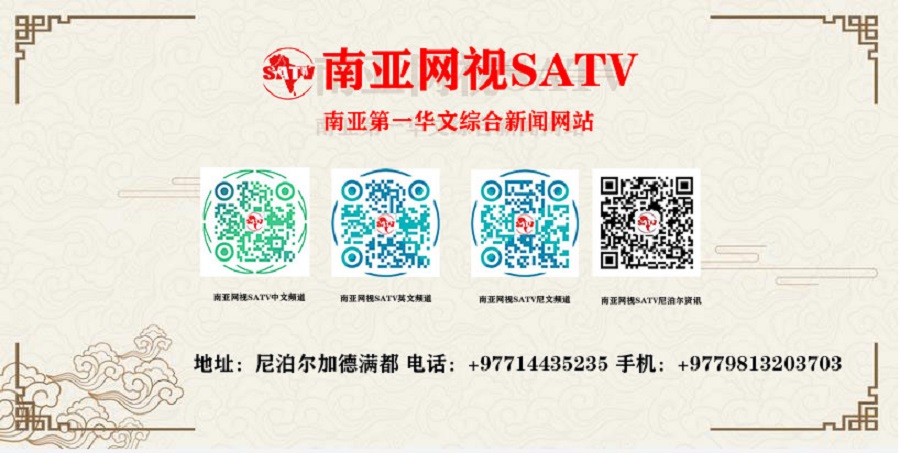
Lalitpur Mayor Chiri Babu Maharjan stands in the rain with an umbrella to impose an 8am-8pm ban on four-wheelers on the Bhanimandal-Ekantakuna road on Tuesday. Post Photo
A jurisdiction dispute over vehicular traffic management has started between the Kathmandu Valley Traffic Police Office and the Lalitpur Metropolitan City.
On Tuesday, traffic police removed the one-way sign post placed at Ekantakuna, where the City had last week imposed a one-way traffic rule on the Nakkhu-Ekantakuna road section citing increasing traffic jams and accidents.
Lalitpur Mayor Chiri Babu Maharjan immediately reached the place, and reprimanded the traffic police personnel. He called up Nepal Police Inspector General Dhiraj Pratap Singh and said: “Don’t disturb me at my work”.
“The police removed the board without informing us,” said Maharjan, claiming that the City’s traffic management falls under his jurisdiction.
Earlier, the City imposed one-way rule on ten various road sections, Maharjan added. According to the Lalitpur Metropolis, it has deployed 24 municipal police at different road sections to help ease traffic jams and to enforce the one-way rule.
The Kathmandu Valley Traffic Police, however, say they consider the City’s decision to unilaterally impose one-way rule as a breach of their jurisdiction and removed the board as directed by Inspector General Singh.
Lalitpur on July 26 imposed one-way rule on the Nakkhu-Ekantakuna section between 8am and 8pm and at three other places including Bakhundole, Patan Dhoka, and Bhanimandal. Before this, the City imposed one-way rule at Mangalbazar, Patan Dhoka, Lagankhel, Tangahal and Patan Sundhara, among other areas.
“The police didn’t do anything to resolve the traffic jams in those areas and when we stepped in, they are complaining about a breach of jurisdiction,” said Maharjan.
But the Valley Traffic Police Office says Lalitpur Metropolis did not conduct proper consultations with them before unilaterally imposing new traffic rules.
“Our main focus is to resolve traffic jams and reduce accidents,” said Mira Chaudhari, deputy inspector general of the Kathmandu Valley Traffic Police Office.
She said Lalitpur had written to the Valley Police just two days before implementing the one-way rule at various locations.
“Don’t we need time for an assessment?” Chaudhari questioned. “Lalitpur’s announcement was haphazard, and it has created more problems.”
She cited the example of the City’s imposition of one-way rule in the Bakhundole area and said that affects traffic on the main road at Kandevtasthan and the Sanepa area. “Their rule has caused similar problems in many places,” said Chaudhari.
Mayor Maharjan, however, claims his office’s decision has provided relief to the locals and commuters. “After we made road sections at Bakhundole and Ekantakuna one-way, many people expressed relief. Qatar’s ambassador to Nepal called me up and thanked me,” said Maharjan.
Maharjan, however, said the City is ready to backtrack on its decision if the new rule is unscientific or has troubled the public.
Transportation and traffic engineers say the jurisdiction dispute would not arise if the two authorities worked in a coordinated manner.
“If only the City had consulted the traffic police, the Department of Roads, and traffic engineers, it could have brought about a lasting solution,” said Ashish Gajurel, a transport engineer.
Before enforcing one-way rule, they should study its impact on the main road, he said.
“Because traffic jams have a ripple effect across the Valley roads,” said Gajurel.
Khim Lal Devkota, an expert on federalism and local governance and a National Assembly member, blamed the central government for concentrating all the powers in itself, even when there are multiple layers of government.
If the central government had given the responsibility of roads, water supply and other infrastructure to the local government, it would have been more effective, said Devkota.
Senior Advocate Chandra Kanta Gyawali says it is the federal government’s responsibility to manage road traffic and the local governments should play the role of a facilitator.
“Local governments should work in coordination with the federal government to provide relief to citizens,” said Gyawali.
“Local governments can’t deploy municipal police to manage road traffic. Traffic police are deployed under the federal government and they are trained for the work,” said Gyawali.













